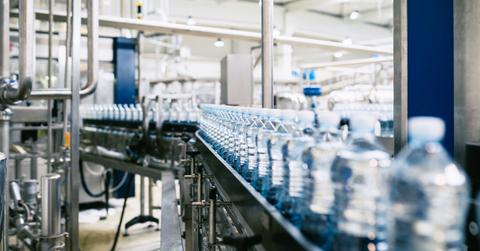U.K. Introduces Plastic Packaging Tax, Potentially Reducing the Demand for Virgin Plastic
The U.K. government is also streamlining household recycling and composting collections and introducing a bottle deposit return scheme.
Updated Feb. 18 2019, 12:19 p.m. ET

In response to the overwhelming amount of plastic polluting the planet, the U.K. government is implementing a new plastic packaging tax. As explained in a summary of the plans on the government website, there will be a tax on any plastic packaging with less than 30 percent recycled content, beginning in April 2022.
According to the summary and the full consultation document on this tax, back in March 2018, the U.K. government put out a call for evidence that the tax system needed to tackle plastic packaging, and a whopping 162,000 responses were sent in. Many replies provided evidence that new plastic is actually cheaper than recycled plastic, which is why so many producers prefer virgin plastic. So in order to encourage more producers to use recycled plastic, which has a lower environmental impact, the government is taxing any packaging that doesn't have at least 30 percent recycled content.
At the moment, packaging producers only pay about 10 percent of the cost associated with taking care of the packaging waste, a press release on the government website explained. The new tax is a massive pivot, as it will force manufacturers to cover the entire cost of dealing with the waste. So as long as that amount is more costly than the price of transitioning to 30 percent recycled plastic, this will be a great incentive for plastic packaging producers to source recycled plastic instead of new plastic.
To get into specifics, the tax will be charged at the moment the packaging is "made available for use or onward sale" on the U.K. market, as per the consultation document. If the packaging is manufactured by a different company than the one filling the packaging with food or goods, the manufacturer is the one who will have to pay the tax. For imported packaging or packaging materials, the tax will be charged as soon as the packaging hits the U.K. market.
And according to the press release, U.K. Environment Secretary Michael Gove, who introduced the tax, also plans to streamline household recycling and trash collection. To do so, the government plans to implement clearer recycling labeling so people know what is actually recyclable, a deposit return scheme for bottles and cans, and free weekly food waste and yard waste collection.
"We are committed to going further and faster to reduce, reuse, recycle and cut waste. That’s why we are leading the way to move away from being a ‘throw-away’ society and drive up domestic recycling," Gove said in a statement in the press release. "Through our plans we will introduce a world-leading tax to boost recycled content in plastic packaging, make producers foot the bill for handling their packaging waste, and end the confusion over household recycling."
Even though the new measures will not roll out until 2022, the fact that 162,000 citizens responded to last year's call for evidence shows that people have an interest in supporting the reduction of plastic waste. And considering the fact that the U.K. produces 5 million tons of plastic each year (as per Plastic Free U.K.), it's clear that the U.K. could massively benefit from reducing its consumption of new plastics.